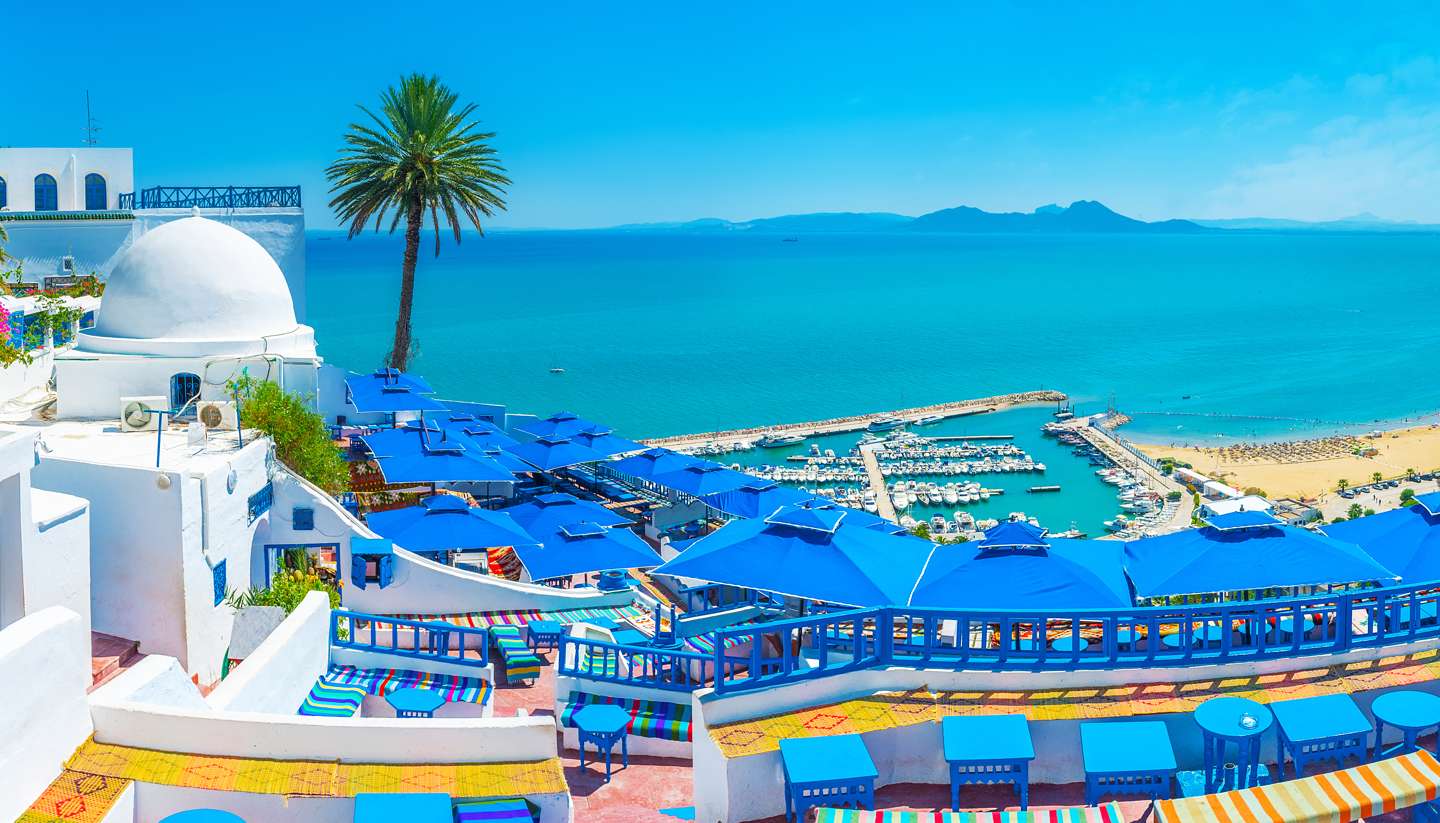Getting Around Tunisia
Air
The national airline TunisAir (www.tunisair.com) and their subsidiary airline TunisAir Express (www.tunisairexpress.com.tn) are the only airlines operating domestic routes within Tunisia. From their hub at Tunis-Carthage Airport they have internal flights to Djerba, Monastir, Sfax, and Tozeur.
Prices are reasonable and services are normally heavily subscribed, so it is advisable to book ahead. However, the compact size of the country (Tunisia is the smallest in North Africa) means flying from A to B is rarely essential other than to save a few hours.
Flight times
From Tunis: to Djerba - 55 minutes; to Monastir - 35 minutes); to Sfax - 45 minutes; to Tozeur - 1 hour 5 minutes.
Departure tax
None.
Road
Tunisia has an extensive road network connecting all of the main towns and cities. Even smaller villages have some form of public transport which makes getting around the country using local transport reasonably easy.
Side of the road
RightRoad Quality
All but the smallest roads are tar-sealed and the main motorways are generally in very good shape. Potholes can be a problem on minor roads.
Road Classification
There are three main motorways in Tunisia. The A1 Motorway links Tunis and Sfax, the A4 heads north from Tunis up to Bizerte, and the A3 heads out from Tunis to the city of Beja inland.
Other major roads in Tunisia are usually designated with either a 'P' (A road) or 'C' (B road) classification and link even the main population centres in the country's southern Sahara.
Car Hire
You can find major international and local companies at all international airports and within bigger towns. Hire is relatively expensive; the charge usually includes insurance and breakdown cover. To hire a self-drive car, you must be over 21.
Taxi
There are two kinds of taxis in Tunisia. Private metered taxis are readily available within towns and cities and are reasonably priced. If you would like to hire the taxi for a half or full day it's usually cheaper to negotiate a price rather than work by the meter.
There are also long-distance shared taxis called louages. They leave their departure points when full and serve the whole of Tunisia. This is the quickest form of public road transport, although it can sometimes be a lengthy process waiting for the vehicle to fill. There are many louage stations and prices are similar to those of buses and trains.
Bike
You can hire bikes from many hotels and guesthouses in resort areas such as Sousse and the island of Djerba, and in the town of Tozeur where they are a great form of sightseeing. Most local hired bikes are old and not in top-notch condition.
Anyone wanting to travel long distances by bike in Tunisia is better off bringing their bicycle from home. Cycling can be a pleasant way to see more of the countryside. Cyclists should be aware that rock-throwing can be an issue in remote areas, particularly in the south, and should always stay alert due to haphazard driving.
Coach
The national bus company is SNTRI (tel: +216 71 905 433; www.sntri.com.tn) which runs a fleet of air-conditioned modern coaches between towns and cities across the country. Booking ahead is a good idea during the peak travel season of August and September.
Regulations
Speed limits are 50kph (30mph) in built-up areas, 90kpm (55mph) on the open road and 110kph (70mph) on freeways. Seatbelts are compulsory in the front seats.
Breakdown services
Touring Club de Tunisie (tel: +216 71 323 114 or 182; www.touringclubtunisie.org), based in Tunis, can be of assistance in case of emergency breakdown.
Documentation
Visitors must hold a full EU or international driving licence that has been valid for at least one year.
Road note
Tunisian roads are clearly signposted with road signs in French as well as Arabic. Drivers should be vigilant at all times for livestock wandering onto the road, and in built-up areas, pedestrians.
Urban travel
Tunisian cities and resorts are generally easy to get around by taxi, with the capital also offering local electric train services and a tram network. Care should be taken if driving, as pedestrians have a tendency to walk on the roads.
Rail
Regular trains are run by SNCFT (tel: +216 71 345 511; www.sncft.com.tn) and connect Tunis with major towns. The main route is north-south between Tunis and Gabès, via Sousse and Sfax, with a branch line to Monastir and Mahdia. Other lines out of Tunis link the capital with Bizerte and other northern spots.
There are three classes (classe confort, first class, and second class) all of which are air conditioned on most routes. Some 'Express' trains are one class only. It's a good idea to book in advance for popular routes, particularly over the summer months, though passengers can only book within 3 days of departure time and the best approach is to visit a train station and pay for the tickets in cash.
The historic Lezard Rouge (Red Lizard) train is a not-to-be-missed journey for train enthusiasts in Tunisia. The restored train carriages date from 1911 and the route, which runs three to five weekly from Metlaoui, offers passengers the spectacular views of Selja Gorge (tel: +216 76 241 469; www.lezard-rouge.com).
Rail Passes
Visitors who plan to make regular use of the rail network should buy a seven-, 15- or 21-day carte bleue (blue card), allowing unlimited travel on all routes. See SNCFT (www.sncft.com.tn) for details.
Water
Ferries operate between Sfax and the Kerkennah Islands, and between El Jorf and Djerba Island.


